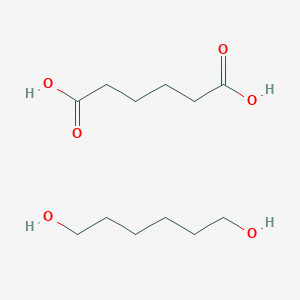Organic Chemistry
- • Amides (2600)
- • Alcohols, Phenols, Phenol Alcohols (305)
- • Nitrogen Compounds (248)
- • Nitrile Compound (83)
- • Hydrazine or Hydroxylamine Derivatives (203)
- • Quinones (38)
- • Ethers and Derivatives (182)
- • Aldehydes (108)
- • Carboxylic Acids and Derivatives (754)
- • Hydrocarbons and Derivatives (2305)
- • Ketones (71)
- • Inorganic Acid Esters (169)
- • Heterocyclic Ring (332)
- • Organometallic Compounds (958)
- • Organosulfur Compounds (69)
- • Phosphines (725)
- • Organometalate (283)
- • Organic Fluorine Compound (2103)
- • Triazenes (18)
- • Semicarbazides (33)
- • Organoselenium Compounds (28)
- • Nitro Compounds (94)
- • Nitrates (15)
- • Lactones (240)
- • Imines (24)
- • Free Radicals (46)
- • Dioxins and Dioxin-like Compounds (31)
- • Cyanates (31)
- • Coordination Complexes (3059)
- • Boron Compounds (84)
- • Azides (66)
- • Arsenicals (56)
Related News
-
ECHEMI High Quality Inquiries (30 Aug-4 Sep)
2024-09-05 -
Mitsui Chemical decided to close the Phenol production line at its Ichihara plant in Japan
2024-04-08 -
How to Convert Phenol to Picric Acid?
2023-08-03 -
The European cumene market continues to be weak
2023-07-26 -
The domestic phenol market may bottom out
2022-11-17 -
INNEX acquires Mitsui Singapore Phenol for $330 million
2022-09-01
Sort Alcohols, Phenols, Phenol Alcohols Alphabetically
Alcohols, Phenols, Phenol Alcohols
Get Alcohols, Phenols, Phenol Alcohols Raw Materials by RegionAluminum stearate
(637-12-7)-
Industrial grade / 99%
-
Industrial Grade / 99%
-
- / 0.00%
-
- / 99.00%
Request for quotation , get quotes from more suppliers.
Alcohols, lanolin
(8027-33-6)-
- / 0.00%
-
- / 99.00%
-
Industrial Grade / 99%
$3300-3500/MT FOB
-
Industrial Grade / 99%
Request for quotation , get quotes from more suppliers.
Alcohols, C7-9-iso-, C8-rich
(68526-83-0)-
Industrial Grade / 99%
-
Industrial Grade / 99%
-
![2-ETHYL-1-HEXANOL buy 2-ETHYL-1-HEXANOL]()
Industrial Grade / 99%
-
![2-ETHYL-1-HEXANOL buy 2-ETHYL-1-HEXANOL]()
-
Industrial Grade / 99%
-
![POLY(1 6-HEXAMETHYLENE ADIPATE) AVERAG& CAS NO 25212-06-0 buy POLY(1 6-HEXAMETHYLENE ADIPATE) AVERAG& CAS NO 25212-06-0]()
Industrial Grade, Feed Grade, Food Grade, Pharma Grade / 99%
$11.11/KG EXW
-
![POLY(1 6-HEXAMETHYLENE ADIPATE) AVERAG& buy POLY(1 6-HEXAMETHYLENE ADIPATE) AVERAG&]()
-
![POLY(1 6-HEXAMETHYLENE ADIPATE) AVERAG& buy POLY(1 6-HEXAMETHYLENE ADIPATE) AVERAG&]()
Request for quotation , get quotes from more suppliers.
-
-
![Acenaphtho[5,4-d]thiazole (8CI,9CI) buy Acenaphtho[5,4-d]thiazole (8CI,9CI)]()
-
![Acenaphtho[5,4-d]thiazole (8CI,9CI) buy Acenaphtho[5,4-d]thiazole (8CI,9CI)]()
-
![Acenaphtho[5,4-d]thiazole (8CI,9CI) buy Acenaphtho[5,4-d]thiazole (8CI,9CI)]()
Industrial Grade / 99%
Request for quotation , get quotes from more suppliers.
Source Alcohols, Phenols, Phenol Alcohols Products Supply
Alcohols, coco
(68425-37-6)-
Industrial Grade / 99%
$2350-2750/MT FOB
-
![Alcohols, coco buy Alcohols, coco]()
Industrial Grade / 99%
-
![Alcohols, coco buy Alcohols, coco]()
-
![Alcohols, coco buy Alcohols, coco]()
Industrial Grade / 99%
Request for quotation , get quotes from more suppliers.
-
Chemical Grade / 99%
-
Pharmaceutical grade / 99%
$10/KG EXW
-
![9-Acridinemethanol buy 9-Acridinemethanol]()
-
![acridin-9-ylmethanol buy acridin-9-ylmethanol]()
Request for quotation , get quotes from more suppliers.
More Information
Alcohols, phenols, and phenol alcohols are pivotal chemical compounds employed in diverse industrial applications, ranging from pharmaceuticals to personal care products. Alcohols, characterized by the presence of a hydroxyl (-OH) group, are widely utilized as solvents, disinfectants, and antiseptics. Ethanol, for instance, is commonly used in hand sanitizers and disinfectants due to its antimicrobial properties. Phenols, featuring a hydroxyl group attached to an aromatic ring, exhibit strong antiseptic and disinfectant properties. Phenol alcohols, compounds that combine features of both alcohols and phenols, offer a unique blend of properties. One example is benzyl alcohol, which serves as a solvent, preservative, and fragrance ingredient in cosmetic formulations.
The synthesis of alcohols, phenols, and phenol alcohols involves a range of chemical reactions, including hydroxylation, oxidation, and esterification. By carefully controlling these reactions, chemists can tailor the properties of these compounds to meet specific application requirements, ensuring their effectiveness and safety in various industrial and consumer products.
Common phenol uses:
● Disinfectants and antiseptics
● Chemical intermediates
● Adhesives and resins
● Textile manufacturing
● Herbicides
● Personal care products






















![Acenaphtho[5,4-d]thiazole - buy Acenaphtho[5,4-d]thiazole -](https://file.echemi.com/fileManage/upload/goodpicture/20230106/m20230106085908965.jpg)
![Acenaphtho[5,4-d]thiazole (8CI,9CI) buy Acenaphtho[5,4-d]thiazole (8CI,9CI)](https://file.echemi.com/fileManage/upload/canonicalSmiles/20220812/117511d66845416180a99c77574320ca.png)
![Acenaphtho[5,4-d]thiazole (8CI,9CI) buy Acenaphtho[5,4-d]thiazole (8CI,9CI)](https://file.echemi.com/fileManage/upload/cas/123/103fe7db-e68a-4046-9f3f-f9c187773600.gif)




